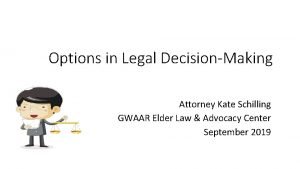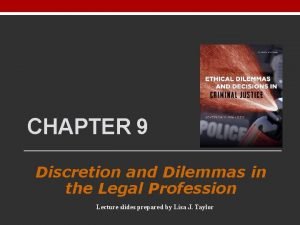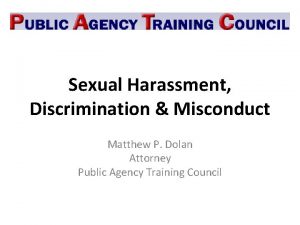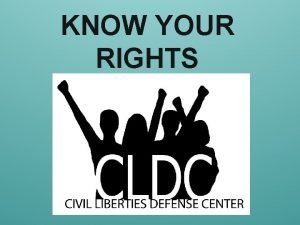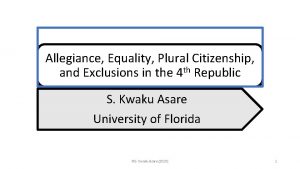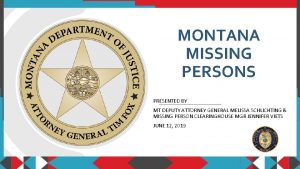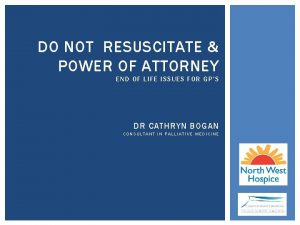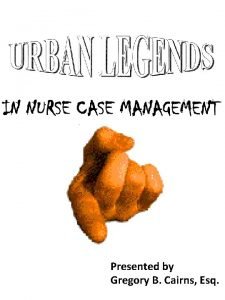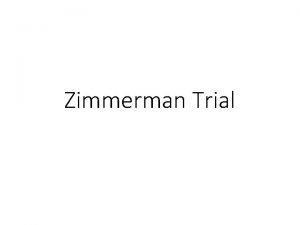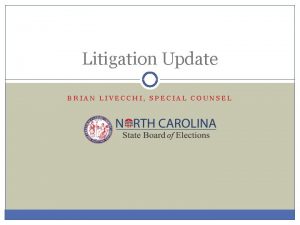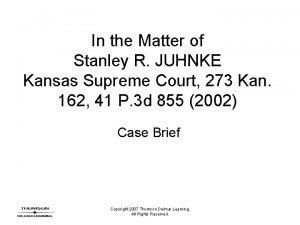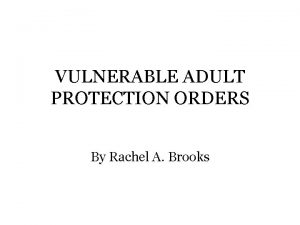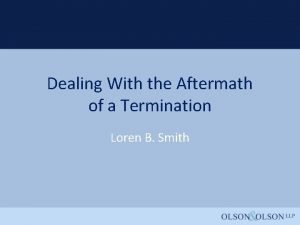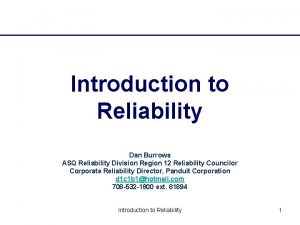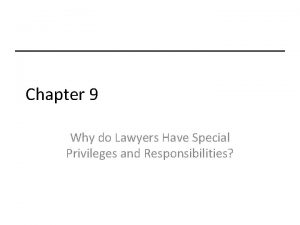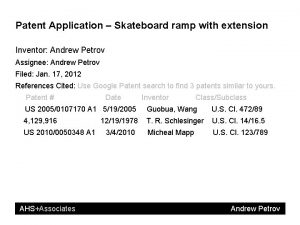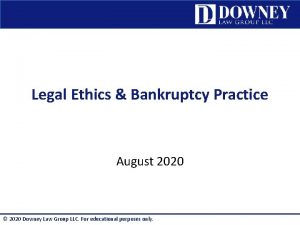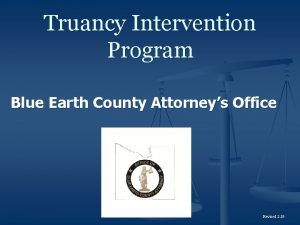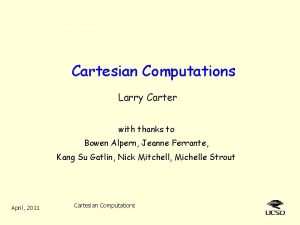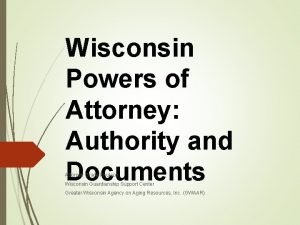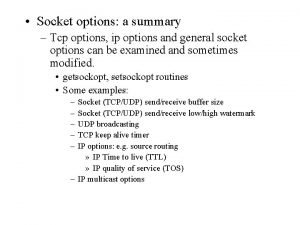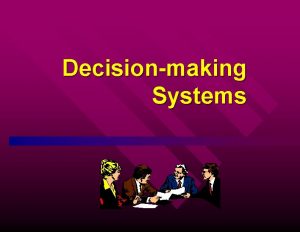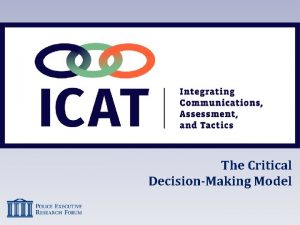Options in Legal DecisionMaking Attorney Kate Schilling GWAAR








































































- Slides: 72

Options in Legal Decision-Making Attorney Kate Schilling GWAAR Elder Law & Advocacy Center September 2019

Core concepts • WI is not a next-of-kin or “family consent” state • Need legal authority to act on another’s behalf

Legal authority • From a person: • Power of attorney document • Authorized representative for a benefit • From a court: • Guardianship action • Personal representative (executor)

Current formal tools for people who need help with decisions Release forms • Person signs release forms authorizing a specific person(s) access to certain kinds of records (health, financial, etc. ). • Some release forms may allow a person to select certain records to be released while retaining privacy over others. • Some release forms may provide one-time or time -limited access to records, others releases may remain in effect in perpetuity. Supported Decision-Making agreements • Person makes all their own decisions. Person identifies area in which they want support, identifies a Supporter(s) to help them gather information, compare options, and communicate their decisions to others. • The Supported Decision. Making agreement outlines what types of decisions the Person wants support and the role of the Supporter. • Agreement can be changed or stopped at any time by the Person or Supporter. Representative payee The Social Security Administration (SSA) appoints an individual/organization to receive SSI/SSDI benefits for a person who cannot manage or direct the management of their own benefits. To change a Representative Payee, the Person must complete an application process with the SSA. Power of Attorney • Formal legal arrangements that permit others to act on the Person’s behalf. • Powers of Attorney (POA) designate another (agent) individual to make certain decisions (generally health care or financial) on the Person’s behalf. POAs can be set up in different ways. Some POAs are activated only when a person is incapacitated. Limited or Full Guardianship • Transfers some or all decision-making authority from the Person to a court-appointed Guardian. • Once guardianship is granted by the courts it is difficult (and costly) to modify or reverse the guardianship; any changes must be made through a formal court process. • No least restrictive alternatives

Representative payee • Can be solely for SSA funds • Payee must be approved by SSA • POA or guardianship order not sufficient • Or can be for all of the person’s income and assets • Fiscal Assistance in Dane County • Organizational rep payees can be paid (~$45/month)

Conservatorship • Voluntary • No determination of competency • Someone else to pay bills and manage money • Typically has powers and duties of guardian of estate

Power of attorney • Legal contract • Gives chosen person(s) • Authority to act on one’s behalf • Agent must act in accordance with person’s wishes

Power of Attorney forms • State form POA-F or POA-HC • Five Wishes • Honoring Choices (various languages) • Documents privately drafted by an attorney

POA-HC Authority of Agent • Oversee healthcare & medical issues • Admit to a NH • Make treatment decisions • Pick doctors • Consent to surgery • End of life issues

POA-F Authority of Agent • Manage/buy/sell property • File taxes • Pay bills, manage bank accounts • Sign a lease • Oversee business assets • Manage insurance • Claims litigation • Coordinate and apply for public benefits (Wis. Stat. 244. 54)

POA-F Agent Authority Limitations Powers not included unless expressly and clearly stated: • Create/amend/revoke/terminate a trust (Wispact) • Gifting • Change a will, rights of survivorship, or beneficiary designation • Delegate authority granted under the power of attorney

Special Note about Benefits • POA-F agents have the ability to sign the principal up for benefits and manage insurance. • Per the current MEH 2. 5. 1. , the people who can sign are: • Guardians of the Estate • Authorized Representatives • POA-F agents 12

POA—Standard for decisions • Agent must follow expressed wishes of principal • If unknown, best interest standard • Agent cannot supplant his opinion in place of principal’s

Execution requirements– POA-F • Signed by the principal, OR • Signed by another adult upon the principal's direction and his or her “conscious presence” Strongly recommended to be notarized

Execution requirements– POA-HC • Dated, in writing, signed by principal, and • Signed in presence of 2 witnesses • Witnesses must not be: • • • related by blood or marriage under age 18 health care workers (exception for SW and hospital chaplain) expected to inherit under will/trust/life insurance, etc. the agent

Activation Agent’s authority is activated either: A. Immediately B. Upon later incapacity Agent’s authority always terminates upon death

Activation of POA When does agent’s authority start? today Power of attorney authority incapacity death

POA Activation-Considerations Now Upon disability • Upon execution of docs • Convenience--banking • Travel or leave country • No court oversight • “Springing” • Keeps it private • Reduces risk of unauthorized use

POA Co-agents • Co-agents = two people have the authority at the same time • Independent authority? • Both needed sign every single check? • Co-agents are allowed for POA-F (not allowed for POA-HC) • Co-agents are typically not recommended Instead, utilize alternate agent or successor agent in the event first person is unwilling or unable to act.

Revocation of POA • Person can revoke at any time (Wis. Stat. 155. 40) • Draft and sign short statement revoking agent’s authority and provide copies of statement to appropriate parties, including the agent • Revoke by tearing it up or burning document (& all copies) • Execution of new POAF does not automatically revoke prior POA-F, unless expressly stated. • Execution of new POA-HC does revoke prior one.

Review the conduct of a POA agent • Petition to Review the Conduct of an Agent--file with the court • Court can order return of money, assets • Court can remove the agent • Wis Stats. 244. 16 & 244. 17

POA usually sufficient • No court involvement • Low cost • You pick your agent • You decide what rights • Reflects person’s own wishes . . . BUT

A POA cannot • Keep person in a nursing home against her wishes • Admit/hold a person in a locked unit • Write a will on behalf of the principal • Change beneficiary designations • Appoint a new agent • Create a special needs trust (unless expressly stated)

Exception - Wis. Stat. 50. 06 • Exception to need for guardianship and PP • Family members can consent to admission to rehab facility • Person must come directly from hospital

Agents unable to act Need additional authority No POA or invalid Guardianship is a legal relationship created by the court

Guardianship Legal relationship created by court

Preliminary matters. . . • Presumption of competency in adults • Guardianship is not an extension of parenthood • Guardianship is only necessary when lesser restrictive alternatives are insufficient or not appropriate (POA, rep payee, etc. )

Incompetency is NOT: • Physical disability • Mere old age • Eccentricity • Poor judgment Wis Stat. 54. 10(3)(b)

Incompetency-legal standard • Inability to receive, evaluate, and communicate decisions. • And qualifying impairment or disability • Risk of physical/financial harm • Needs cannot be met by lesser alternative Incapacity to activate a POA

Who can petition for a guardianship? • Immediate family members • POA • NH • Hospital • County (APS, Corporation Counsel) • Other interested persons

Guardianship is a court process • Legal finding of incompetency • Court chooses guardian • Court decides authority • Best interest standard • Takes 1 -3 months

Role of attorneys • Petitioner’s atty: bring forth the guardianship action, sometimes represents proposed guardian • Guardian ad litem: advocate for best interest standard, eyes and ears of court • Advocacy counsel: opposes guardianship, advocates for wishes of proposed ward

Due Process Rights of proposed ward • Be at the hearing • Oppose the guardianship • Advocacy counsel • Cross examination • Closed hearing • Trial by a jury

Ward’s right to be at hearing • Ward has a right to be at the hearing. • Petitioner must ensure ward’s attendance at hearing (unless waived by GAL). • Ward, GAL, or advocacy counsel may request that the guardianship hearing be held at a hospital room, nursing home, or similar pursuant location under Wis. Stat. 54. 44 (4)(a)

POA & Guardianship Court can: 1. Keep POA in place with guardianship 2. Revoke POA authority entirely

Guardianship KEEP POA AGENT REMOVE AGENT • Reflection of the person’s own wishes • Less restrictive • Bad judgment • Misappropriation of funds • Untrustworthy

POA agents are preferred guardians • The court shall appoint as G of E the agent under POA-F, unless not in best interests of the proposed ward. • The court shall appoint as G of P the agent under POA-HC, unless not in best interests of the proposed ward. • Wis. Stats. 54. 15 (2) and (3)

Types of guardians 1. 2. 3. 4. Family member or friend Volunteer guardian Corporate guardian (see DHS 85) Paid guardian, but not regulated by DHS

Guardianship hearing • Judge (or jury) decides with input from GAL • Burden of proof is clear and convincing evidence • Doctor provides report and testimony • Social worker report and testimony (if PP) • County procedure varies slightly

Guardianship--timeframes Temporary “Permanent” • Can get within 1 -3 weeks • Lasts 60 days • Can extend another 60 days* • In place long-term • Until challenged or removed *After this, a court loses jurisdiction to order a guardianship for the next 90 days.

Guardian of Person • • Make medical decisions Find appropriate housing Arrange for in-home supports Help access DVR or vocational coach Estate • • • Pay bills Manage bank accounts, invest money Sign a lease Sign a cell phone contract Apply for public benefits --54. 20(3)(e)

Powers of a Guardian • Guardian only has powers authorized by court order or statute • All other powers and authority are retained by the ward • Always check the paperwork! • Order for Guardianship • Letters of Guardianship • NOT the petition for Guardianship

Guardian—Standard for decision making • Best interest standard ***Strong consideration given to ward’s preferences • Fiduciary duty • Reasonable and prudent person • Diligence and good faith

Current WI law requirements Guardian of person shall • “place the least possible restriction on the individual’s personal liberty and exercise of statutory rights, and promote the greatest possible integration of the individual into his or her community. ” • Wis. stat. § 54. 25 (2)(d) 3. b

Current WI law requirements Guardian of estate • shall “provide a ward with the greatest amount of independence and self-determination with respect to property management in light of ward’s functional level, understanding. . . personal wishes and preferences. . . ” • WI stat § 54. 19, see also § 54. 20

Potential issues (not addressed in paperwork) • Dignity of Risk • Issues with sexuality • Balancing health & safety concerns with right to association (friendships) • Considering ward’s preferences when making decisions

BALANCING Selfdetermination Protection

Decisions contrary to ward’s wishes In making a decision contrary to the ward’s expressed wishes, guardian shall take into account: • Understanding of the nature and consequences of the decision • Level of risk involved • Value of the oppty for the individual to develop decision making skills • And the need of the individual for a wider experience Wis. Stats. 54. 25

Guardians exceeding authority Generally speaking, a guardian does not have authority to: • Limit visitors or friends or phone calls • Limit expression of religion • Limit right to file grievances or consult with advocacy agencies • Restricting personal choices like clothing, time go to bed, haircuts Ward retains ability to express preferences for activities, friendships, and social outings

Review Conduct of Guardian • Failing to file inventory or accounting • Fraud, waste, mismanagement • Self-dealing or gifting • Failure to provide for needs of ward, including applying for public benefits • Failing to act in best interest • Other: exceeding authority of guardian See Wis. Stat. § 54. 68

Review Conduct of Guardian • Court can instruct guardian • Court can remove guardian • Court can order guardian to pay costs & fees of hearing • Court can fine guardian up to $10, 000 • Court can require guardian to reimburse the ward Tip: if unsure, ask the court in advance for permission or instructions!

Authority ends upon death • Both guardian and POA authority end at death • File final accounting, notify Social Security • Personal representative (executor) takes over

Guardianship PROS CONS • Court approval, oversight • Annual accounting • Authority, clarity • Court declaration of incompetency • Takes 1 -3 months • Costly • Can be contested • Not as tailored as POA • Emotional, invasive

Supported Decision-Making “Old concept, new law”

Important concepts: 1. Adults are allowed to make bad choices; 2. The more people are empowered to make choices, the better they become at it; and 3. Empowering people to make choices improves their quality of life.

Supported decision-making “A series of relationships, practices, arrangements, and agreements, of more or less formality and intensity, designed to assist an individual with a disability to make and communicate to others decisions about the individual’s life. ” Dinerstein, Robert D. “Implementing Legal Capacity Under Article 12 of the UN Convention on the Rights of Persons with Disabilities: The Difficult Road From Guardianship to Supported Decision-Making. ” Human Rights Brief 19, no. 2 (2012): 8 -12.

Supported Decision-Making Defined • Process of supporting and accommodating an adult with a functional impairment • To enable them to make life decisions • Including where they want to live, what services, supports and medical care they receive, whom they want to live with and where they want to work • Without impeding the self-determination of the adult Wis. Stat. § 52. 01(6)

Values of supported decision-making • Autonomy • Self-direction • Equality • Least restrictive • Trust • Respect

Supported decision-making Is independent decision making a myth? • Input from family members • Guidance from those with more experience

Parallels of SDM in all adults • Mentorship for new/younger professionals • Learning from mistakes made previously • Gaining knowledge through experience • Asking for advice on major purchases—new house or car • Discussing major medical decisions with family members

What areas do supporters help with? medical financial housing education

When to use SDM • ADRC options counseling • Division of Vocational Rehab; employment • School—IEP • Medical decisions • Financial decisions • Housing

SDM Agreement Requirements • Must be in writing, dated & signed • Requires 2 adult witnesses or notary • Not evidence of incapacity or incompetency • Can be revoked at any time

Who makes the ultimate decisions? Guardianship Supported decision-making • Guardian is decision maker • Input from ward • Best interest standard • Individual is decision-maker • Input from support system • Makes own educated decision • Dignity of risk

What SDM is and is not IS IS NOT • “a seat at the table” • an oppty to learn & develop decision making skills • recognition that we all need support to make decisions • decision-making authority • determination of disability, incapacity, or incompetency • does not supplant need for HIPAA or FERPA releases • does not replace need for POAs

Pros and cons of SDM PROS CONS • Self-determination • Least-restrictive • Less court involvement • Dignity of risk • Flexibility • Potential for abuse? • Relies on natural supports • Time intensive initially • Not suitable for some • Variable • Changes in forms, procedures

States that have SDM laws • • • Delaware Texas Tennessee Wisconsin Washington DC Alaska Missouri Maine Pilot programs: Indiana & Massachusetts In talks: Georgia & Oregon

Resources

WI Guardianship Support Center • Legal information provided to attys, guardians, APS, professionals, and vulnerable adults. • Guardianships, POA, Protective placement, DNR, Living wills • Free quarterly newsletter • Consumer publications • No client representation

WI Guardianship Support Center Contact us: Phone: 855 -409 -9410 Email: guardian@gwaar. org Website: gwaar. org/gsc

Disability Rights WI Protection and Advocacy Agency for individuals with disabilities Family. Care/IRIS ombudsman program for 18 -59 year olds SSI-Managed Care ombudsman program Toll Free Number for Consumers and Family: 800 -928 -8778 • Drug Benefit Helpline (Medicare Part D): 800 -926 -4862 • Disability Voting Rights Helpline: 800 -928 -8778

WI Board on Aging & Long-Term Care (60+) • Ombudsman Program/Helpline 800 -815 -0015 • Medigap Helpline 800 -242 -1060 • Medicare Part D Helpline 800 -677 -2783
 Dr kate schilling
Dr kate schilling Survey of household economics and decisionmaking
Survey of household economics and decisionmaking Kate del castillo negrete trillo
Kate del castillo negrete trillo Erratic
Erratic Hyatt legal plans attorney list
Hyatt legal plans attorney list Megaloblastic anemia mcv
Megaloblastic anemia mcv Schilling test
Schilling test Cara menghitung jumlah leukosit
Cara menghitung jumlah leukosit Norbert schilling
Norbert schilling Ma are
Ma are Schilling chemie
Schilling chemie Schilling test
Schilling test Escala khorana
Escala khorana Mitral facies
Mitral facies Alexandra schwarz schilling
Alexandra schwarz schilling Jeff arnold attorney
Jeff arnold attorney Chapter 9 lawyer franklin county
Chapter 9 lawyer franklin county Matthew dolan attorney
Matthew dolan attorney Peter neronha attorney general
Peter neronha attorney general Lauren hoover attorney
Lauren hoover attorney Brownsville lhwca lawyers
Brownsville lhwca lawyers Lynn zimmerman attorney
Lynn zimmerman attorney Attorney advertising on social media
Attorney advertising on social media Civil liberties defense center
Civil liberties defense center Natalie dickson attorney
Natalie dickson attorney Jennifer fink attorney
Jennifer fink attorney Clay abbott
Clay abbott Jacobs and wallace attorney
Jacobs and wallace attorney Lucy khairy attorney
Lucy khairy attorney Nationality vs citizenship
Nationality vs citizenship Missing person montana
Missing person montana World power era eoc blitz review
World power era eoc blitz review Retaliation attorney franklin county
Retaliation attorney franklin county Dnar
Dnar Patent attorney newcastle
Patent attorney newcastle Kevin liu attorney
Kevin liu attorney Brian couch attorney hyden ky
Brian couch attorney hyden ky Greg cairns
Greg cairns Ncgs power of attorney
Ncgs power of attorney Justin pfeiffer
Justin pfeiffer Patent attorney newcastle
Patent attorney newcastle Larry jacobs attorney
Larry jacobs attorney Eva adam xxx
Eva adam xxx David keck attorney
David keck attorney Tan hee juan case
Tan hee juan case County attorney
County attorney Mark omara
Mark omara Brian livecchi
Brian livecchi Stanley r juhnke attorney
Stanley r juhnke attorney The evolution of attorney by darrell news - dirga point
The evolution of attorney by darrell news - dirga point Adult protective services vancouver wa
Adult protective services vancouver wa Western district of missouri us attorney
Western district of missouri us attorney Celco debt collector
Celco debt collector Rekeri
Rekeri Jennifer barnes attorney
Jennifer barnes attorney Thomas wade carter
Thomas wade carter When was office of auditor general established
When was office of auditor general established Fox rothschild fiduciary attorney summit
Fox rothschild fiduciary attorney summit Law office of david piotrowski
Law office of david piotrowski Loren brown attorney
Loren brown attorney Asq reliability
Asq reliability Chapter 9 lawyer
Chapter 9 lawyer Patent attorney side business drafting drawings
Patent attorney side business drafting drawings Jessica dean attorney
Jessica dean attorney Sdm powers and duties
Sdm powers and duties Willie cantu attorney
Willie cantu attorney 8 methods of tax attorney domination - indorecipe
8 methods of tax attorney domination - indorecipe Katy johnson non attorney spokesperson
Katy johnson non attorney spokesperson Truancy consequences
Truancy consequences Denise holliday attorney
Denise holliday attorney Eb5 united
Eb5 united Flsa attorney adams county
Flsa attorney adams county Larry bowen attorney
Larry bowen attorney
